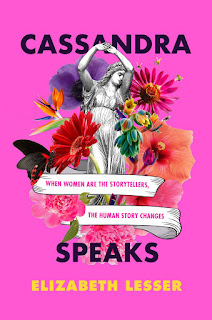https://aninjusticemag.com/women-power-stories-an-interview-with-author-elizabeth-lesser-53de62f8f4f8
Elizabeth Lesser, author of “Cassandra Speaks”; remind me of Dunja. We are shaped by the stories we tell, as individuals and as a culture. We are profoundly influenced by stories, myths, fables, and legends. When Women Are the Storytellers, the Human Story Changes (September, Harper Wave). She argues that by giving women equal voice, we would have a different set of guiding stories that value caretaking, compassion, and communication.
Women had been working against a lot of odds to find our equality, find our voice, find our influence in a world that desperately needs our influence. When we go back to the old stories, women are punished when they claim power. (Even men where)
And you see it with the story of Cassandra. Cassandra was given the gift of prophecy, but she was also cursed and told that no one would believe her. She said her truth, she called out things that she saw in her culture that shouldn’t be happening, but no one believed her and she was driven mad. We have all these stories where women are punished for being powerful.
Power just means wanting to influence your own world, your family, your business. We all have that urge, but women have been shamed into thinking that if we want power, there’s something too aggressive about us, too bossy. There’s this idea that something deep inside of a woman, our core self, there’s something shameful about it. Why would we want to bring that out and influence the world?
Shelley Taylor, a researcher at UCLA, looked at this idea that the only reactions to stress are fight or flight. That has been our understanding forever, that under stress and duress, humans do one of two things: fight or retreat. Dr. Taylor began to look at how female mammals respond to stress. And she came up with the term “tend and befriend.” Female animals, including women, do not react to stress with fight or flight, but are more likely to tend and befriend. This has been shown often in corporate America, where often women’s response to stress is to create a sense of belonging in a team, as opposed to “I’m the only one who knows how; I don’t need to ask for other people’s opinions; your opinion is less important than mine.” It’s more a gathering of ideas and a gathering of people into a sense of belonging.
The first thing to bring transformation is to know [the stories]. If you don’t know the story, you can’t write a new one.
There is a made up word innervism. There are a lot of the people working for peace and justice causes who are really angry people, people who had never taken care of themselves and were projecting their own stuff all over their issues. We need to work on it in ourselves. If you want to walk this path in every part of life, that involves some kind of inner work. That’s called as innervism.
We need to work on our own peace of mind, so we can be a real peacemaker. If we can match up what we want out there with what’s going on in ourselves, we will be much better activists. Gandhi said it in his famous line: Be the change you want to see in the world.
Respect each other’s opinion, even as we fight for our own. That is a new model. If enough women get into all sorts of leadership positions, that we would see that change, especially if women don’t morph so much once we get our foot in the door that we lose the very thing that the world needs.
Feeling ready to change the story? Elizabeth Lesser suggests ways that we can reclaim our voices and flip the script:
Free yourself from imposter syndrome. Take the VIA Character Survey or other online surveys to learn more about your inherent strengths. Interrupt the imposter’s voice when you hear other women downplaying their achievements or second-guessing their abilities.
Create a list of inspiring women. Share quotes and stories from these inspiring women.
Make your own “Best Of” lists (e.g., books, songs, movies) that include works by women. Use your lists to encourage librarians, bookstore owners, DJs, or others to expand the works they offer and promote.
Pay attention to the language you hear every day. How often do you hear metaphors from war, violence, and sports? Try to go a day without using these metaphors. Instead, make up your own images and metaphors that draw on the kitchen, gardening, art, or other sources.
Think about what “legacy” means to you. Then write your own obituary. Use it to remind yourself of your truest nature, the qualities you want to nurture and the gifts you want to give in your life.


No comments:
Post a Comment